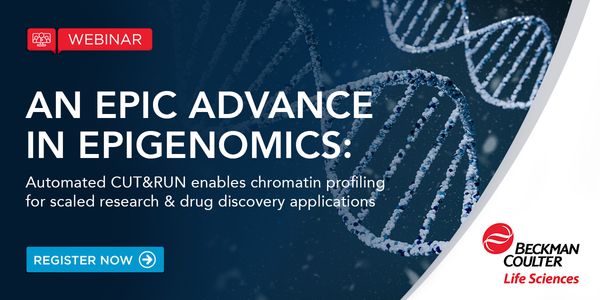Bacterial genome
Bacterial genomes are singular, circular chromosomes. Because bacterial genes only contain one copy of each chromosome, they reproduce by making an exact copy, or clone, of themselves.
-
OCT 24, 2023 | 10:00 AMDynamic changes in chromatin drive gene expression programs during cellular development and contribute to pathological changes underlying disease. To date, efforts to characterize chromatin...OCT 12, 2023 | 6:00 AMAcute coughing is one of the most common reasons for consulting in primary care thus driving considerable antibiotic use and health-care costs. Currently, identification of microbial etiolog...Speaker: Prof. Dr. Greet Ieven, PhD , Israel Figueroa , Jelena Feenstra, PhDSponsored By: Thermo Fisher ScientificEmploying a metagenomic search, we identified a family of miniature CRISPR-Cas type V-L systems capable of RNA-guided dsDNA target cleavage without a tracrRNA. A bacterial depletion screen r...
JUN 29, 2023 | 8:00 AM
Molecular biology workflows within drug discovery and development pipelines rely on the efficient extraction and cleanup of nucleic acids. Maximizing recovery, consistency and speed is achie...
MAY 23, 2023 | 7:00 AM
C.E. CREDITS
Fourier Transform Infrared (FTIR) spectroscopy is an emerging technology in the field of microbiology. Recent studies have shown its utility for bacterial typing and the identification of ou...
FEB 28, 2023 | 11:00 AM
C.E. CREDITS
Date: February 28, 2023 Time: 11:00am (PST), 2:00pm (EST), 8:00pm (CET) Traditional methods of infection prevention to detect healthcare-associated outbreaks have remained unchanged for many...
The CRISPR revolution has begun and shows no signs of slowing down. CRISPR-Cas nuclease-based genome editing strategies hold great promise for the treatment of genetic disorders. However, a...
Pathogen detection and surveillance have become a high priority in both healthcare and environmental settings for the safety of patients and the general public. The COVID-19 pandemic highlig...
Speaker:
Dylan Barbera
Antimicrobial resistance (AMR) detection and surveillance is a high priority in healthcare and environmental settings for the safety of both patients and the general public. However, working...
Speaker:
Daniel Hand, PhD
, Dominic O'Neil, MS, MBA
, Dylan Barbera
Many clinically approved drugs that are prescribed to modulate human physiology are also potent antimicrobials at physiological concentrations. Recent systematic studies indicate that bacter...
MAY 19, 2022 | 8:00 AM
Date: May 19, 2022 Time: 8:00am (PDT), 11:00pm (EDT), 5:00pm (CEST) Mass spectrometry (MS)-based proteomic technologies are increasingly applied in a clinical context for disease classific...
APR 28, 2022 | 9:00 AM
Date: April 28, 2022 Time: 9:00am (PDT), 12:00pm (EDT), 6:00pm (CET) During previous webinars we have discussed the global impact of antimicrobial resistance (AMR) infections, explored biolo...
Pathogen detection and surveillance have become a high priority in both healthcare and environmental settings for the safety of patients and the general public. The COVID-19 pandemic highlig...
FEB 24, 2022 | 10:00 AM
Date: February 24, 2021 Time: 10:00am (PST), 1:00pm (EST) One of the largest global public health crises is the rise of antimicrobial-resistant infections. Globally, over 700,000 people die...
OCT 27, 2021 | 10:00 AM
Date: October 27, 2021 Time: 10:00am (PDT), 1:00pm (EDT) The COVID-19 pandemic has brought global awareness to the dangers of emerging pathogens to human health and welfare. Common molecular...
Varicella zoster virus (VZV) causes two clinically distinct forms of disease, varicella and herpes zoster. These forms can each present with multiple manifestations ranging from lesions incl...
Speaker:
Jon Armstrong, MSc
Learning Objectives: 1. CRISPR-Cas systems are naturally repurposes for non-canonical functions other than cleaving RNA and DNA 2. CRISPR RNA-guided transposases integrate donor DNA without...























